16. what was popular sovereignty according to stephen douglass?
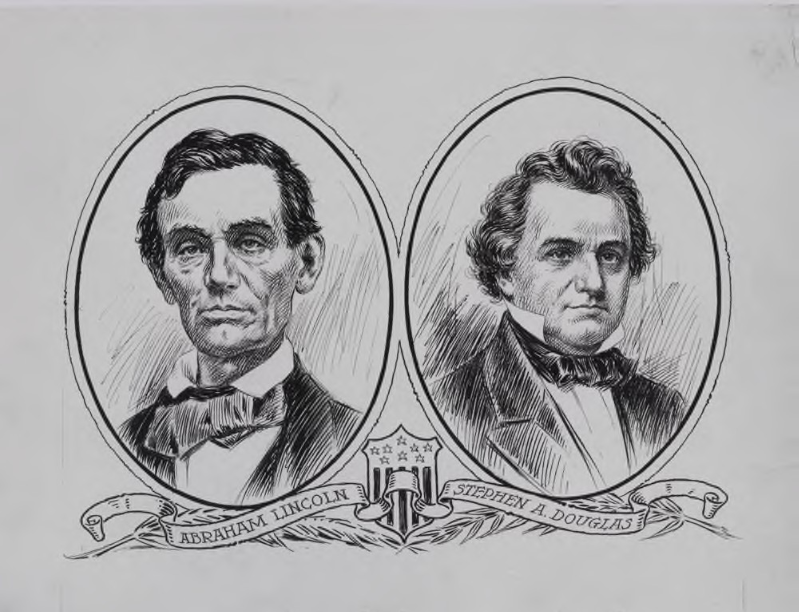
Northern Illinois Academy Digital Library
In 1858 Abraham Lincoln and Stephen Douglas held a series of debates every bit they campaigned for the U. South. Senate seat from Illinois. In these debates i candidate would speak for an hr, the 2nd for an hr and a half, followed by the commencement with a one-half-hour rebuttal. Douglas opened and closed four of the vii debates. The second of these debates was held in Freeport, Illinois on August 27, 1858. At Freeport, Lincoln asked Douglas whether the people of a territory could lawfully exclude slavery prior to the creation of a state constitution. Douglas' answer became known as the Freeport Doctrine and was another in a chain of events, all "linked" to each other, which led to Lincoln's ballot as the 16th President and to civil war.
Douglas on Slavery
The two "links" just earlier the Freeport Doctrine were the Kansas-Nebraska Act, championed past Douglas, and the Supreme Court's decision in the Dred Scott Case.
Prior to passage of Douglas' Kansas-Nebraska Act, the Missouri Compromise had prohibited slavery in the Louisiana Territory northward of 36 degrees, 30 minutes n latitude. The Kansas-Nebraska Act overthrew this and allowed the possibility of slavery in what had been the Louisiana Territory north of the "Missouri Compromise" line.
In the Dred Scot Decision, the U.S. Supreme Court declared that negroes could not be U.S. citizens and that Congress and its designated representative, a territorial legislature, could not prohibit slavery in a territory. This angered many in Illinois and information technology was a fatal blow to Douglas' theory of popular sovereignty. Douglas had championed popular sovereignty as the end to all the controversy over the spread of slavery. Douglas wanted to allow the people of a territory decide if they would have slavery or not. Lincoln and others contended it was the duty of the national regime to regulate slavery in the territories, and the regime should follow through with what they considered were the wishes of the "Founding Fathers" and prohibit slavery in the territories. The Dred Scott determination put an end to both popular sovereignty and the national prohibition of slavery in the territories.
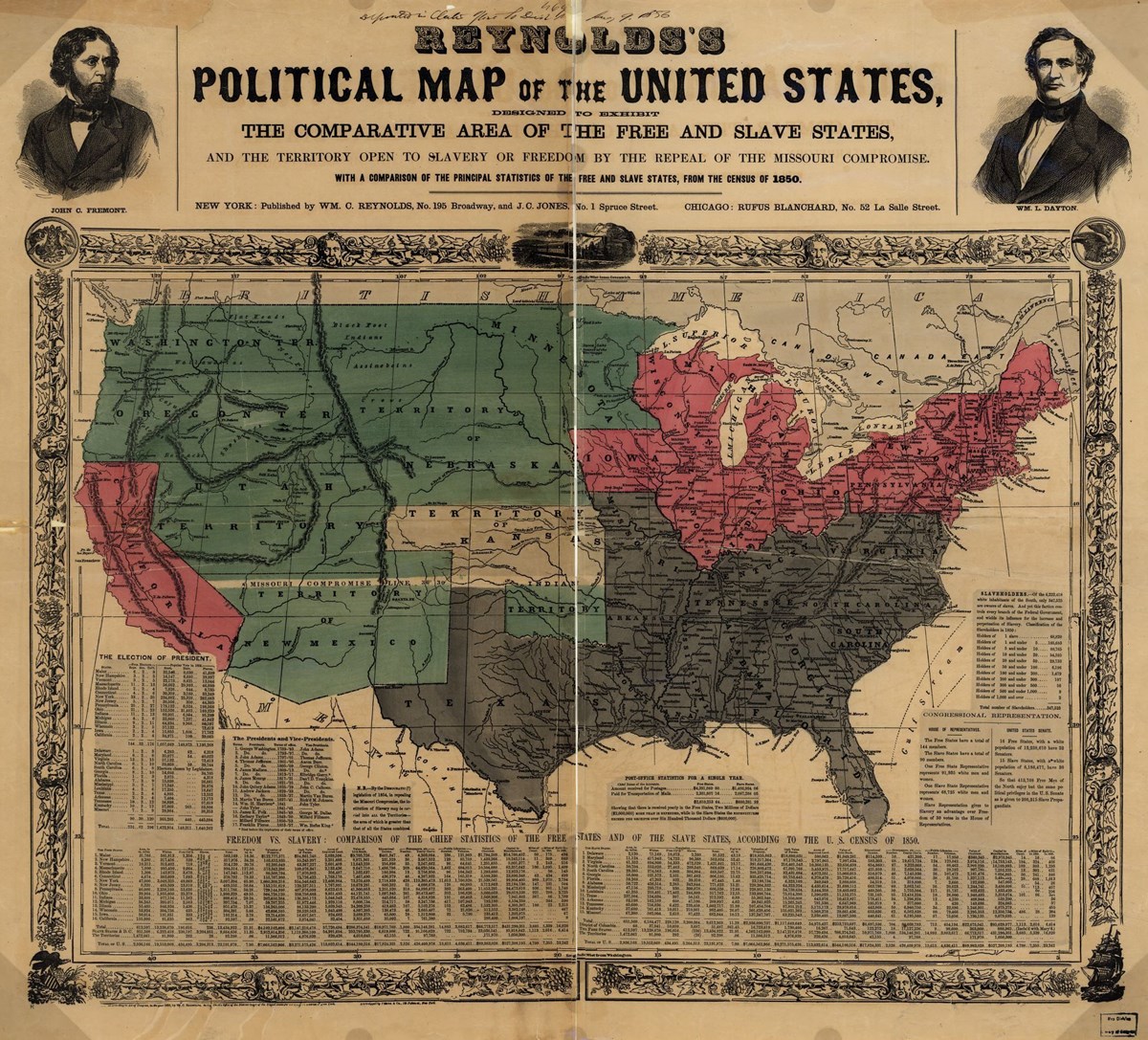
Library of Congress
Lincoln Paints Douglas into a Corner
The question Lincoln posed at Freeport, "could the people of a territory in any lawful way, against the wishes of whatever denizen of the United states, exclude slavery from their limits prior to formation of a state constitution," put Douglas in a quandary. If he said "no" it would displease many people in Illinois and he would likely lose the 1858 election for Senate to Lincoln. If he said "yes," he had to explicate how and he risked the possibility of angering the proponents of slavery who felt information technology was their correct to take their belongings (their slaves) into any territory. The defenders of slavery felt that if they couldn't they were being denied equal protection nether the law. If Douglas chose the afterwards it would hurt his hoped for campaign for the presidency in 1860.
Douglas had answered this question before, and Lincoln knew what the answer would be. But Lincoln wanted to make Douglas respond in what had become a national forum. Through the medium of the telegraph, the Debates were being published the next day in newspapers around the country.
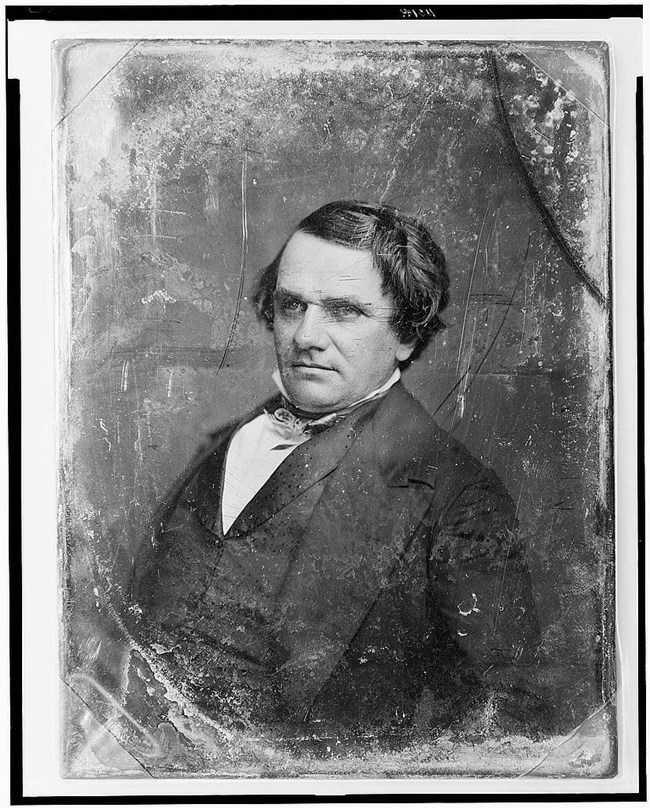
Library of Congress
Douglas Responds
Douglas answered, "the people have the lawful means to innovate it, or exclude it as they please, for the reason that slavery cannot exist a twenty-four hours or an hour anywhere, unless information technology is supported by local law regulations. Those regulations can merely be established past the local legislature, and if the people are opposed to slavery they will elect representatives to that body who will past unfriendly legislation finer preclude the introduction of it into their midst." In other words, Douglas was proverb territorial legislatures could not directly prohibit slavery, just they could pass laws that would make it difficult for slavery to be or fail to laissez passer laws that were needed to protect slavery similar a avoiding slave law and the other customary slave codes.
Douglas was returned to the Senate past the narrowest of margins. But his fear that he would anger the proponents of slavery came true. At the 1860 Democratic National Convention held in April in Charleston, Southward Carolina some delegates from the Due south insisted on a plank in the political party platform that would demand Congress pass federal regulations that would create a fugitive slave police and other slave codes in the territories. Thereby, superceding the territorial legislatures correct to prevent the "introduction of slavery into their midst." Other members of the Autonomous Party refused to have this plank in the party platform. Somewhen the Democratic Party split up and had two candidates for President in 1860. The "Northern" Democrats ran Stephen Douglas and the "Southern" Democrat candidate was John Breckinridge. This carve up in the Democratic Party helped Abraham Lincoln become the first Republican President.
Events Leading to the Civil War
Kansas-Nebraska Act (1854)
Senators Glenville Dodge (Iowa) and Stephen Douglas sponsored many "Nebraska Bills" during the late 1840's and 1850's. The purpose of the beak was to create a territorial government in the vast land betwixt the Missouri River and the Continental Divide [and therefore make a northern route for the Transcontinental Railroad more feasible]. Every attempt to create a Nebraska Territory was defeated by Southern Senators because any states carved out of the territory would be gratuitous because of the Missouri Compromise. In 1854 Stephen Douglas sponsored the Kansas-Nebraska Act. It would create 2 territories and allow the people who moved in that location to decide if they would be slave or free territories.
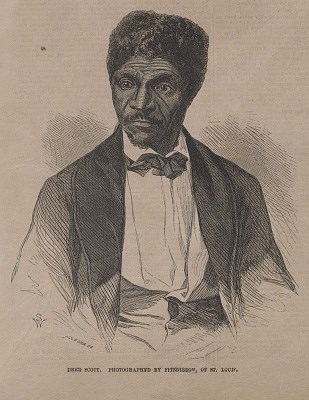
Library of Congress
Dred Scott Decision (1857)
In March of 1857, just a few days later on James Buchanan was inaugurated as the fifteenth President, the Supreme Court issued its determination in the Dred Scott Case. Scott was a slave who had been in a function of Wisconsin Territory where slavery was illegal because of the Missouri Compromise. The Supreme Court had originally voted v to iv on the instance, but at the final minute ii Justices from Pennsylvania [Buchanan'southward domicile land] switched to the majority. The Supreme Court said:
1) Dred Scott could not sue considering blacks could not be citizens of the United States [individual states could grant them state citizenship but they were denied U. S. citizenship because the Constitution was meant to apply simply to white men].
2) Congress had erred in the Missouri Compromise considering the Constitution prohibited the National Authorities from regulating slavery in the territories.
Freeport Doctrine (1858)
In the Freeport Debate Lincoln backed Douglas into a corner past asking, in light of the Dred Scott case, how could a territory prevent slavery? If Douglas said they couldn't, he would lose votes in Illinois where most of the people supported a restriction on slavery in the territories. If he said they could, he would lose back up in the Due south and this might hinder his chances of being elected President in 1860. Douglas said a territory could preclude slavery by failing to pass favorable legislation. In other words the territorial legislature could make it difficult for slave owners to re-capture escaped slaves. Because the Lincoln v. Douglas debates received national coverage the South at present saw Douglas every bit an enemy to slavery.
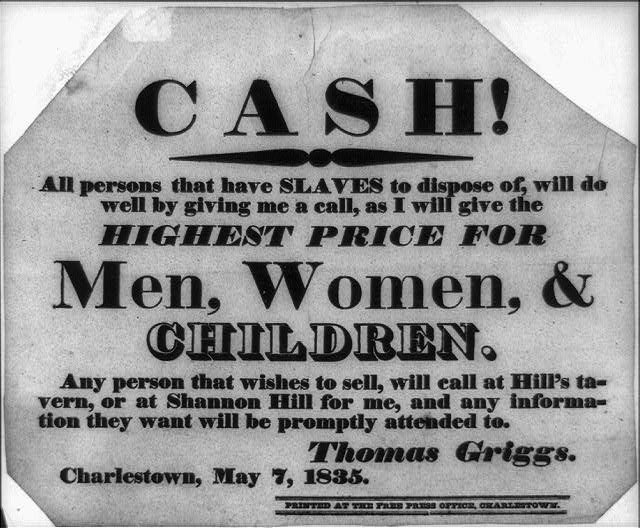
Library of Congress
Southern Demand for a Federal Slave Code (1860)
The Freeport Doctrine caused the South to demand a Federal Slave Lawmaking. They wanted the Federal Government to guarantee slavery could be in all territories. They also wanted the Federal Government to guarantee that a slave owner could travel anywhere in the North with his slave, without having the slave taken away from him past a state court. [Just similar an Ohio farmer could travel with his piece of holding, a horse, anywhere in the South without having it taken away from him by a country court].
For Further Reading
Donald, David Herbert. 1995. Lincoln. New York: Simon and Schuster.
Jaffa, Harry V. 1959. The Crunch of the House Divided. Garden City, NY: Doubleday.
Johannsen, Robert West. 1973. Stephen A Douglas. New York: Oxford University Press.
McPherson, James G. 1988. Battle Cry of Freedom. New York: Ballantine Books.
Zarefsky, David. 1993. Lincoln Douglas and Slavery: In the Crucible of Public Debate. Chicago: University of Chicago Press.
The Collected Works of Abraham Lincoln - 2004, http://world wide web.hti.umich.edu/l/lincoln
Source: https://www.nps.gov/liho/learn/historyculture/freeport-doctrine.htm
0 Response to "16. what was popular sovereignty according to stephen douglass?"
Enregistrer un commentaire